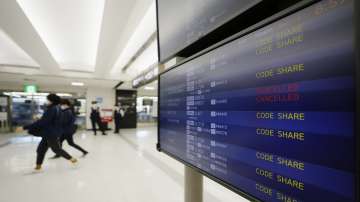South Korea broke its daily record for coronavirus infections for a second straight day on Thursday with more than 5,200 new cases, as pressure mounted on a health care system grappling with rising hospitalisations and deaths.
The rapid delta-driven spread comes amid the emergence of the new omicron variant, which is seen as potentially more contagious than previous strains of the virus, and has fuelled concerns about prolonged pandemic suffering.
South Korea confirmed its first five omicron cases Wednesday night linked to arrivals from Nigeria, prompting the government to tighten its border controls. The country will require all passengers arriving from abroad over the next two weeks to quarantine for at least 10 days, regardless of their nationality or vaccination status.
South Korea since Sunday had already banned short-term foreign travellers arriving from eight southern African nations, including South Africa, and has now extended the same rules to foreigners coming from Nigeria.
While the alarm over omicron has forced governments around the world to tighten border controls, scientists say it is not yet clear whether the variant is more contagious or dangerous than previous strains of the virus, including delta, which has devastated South Korea in recent weeks.
The Korea Disease Control and Prevention Agency said more than 4,100 of the 5,266 new coronavirus cases came from the capital Seoul and its nearby metropolitan region, where officials say 90% of intensive care units designated for COVID-19 are already occupied.
A record 733 virus patients are in serious or critical condition, while the country's death toll is now 3,705 after 47 patients died in the past 24 hours. Health experts have called for the government to reimpose strict social distancing rules that were eased in November to improve the economy, raising concerns that hospital systems could become overwhelmed.
Also Read | Omicron scare: 4 more international travellers test COVID positive at Delhi airport
Latest World News

